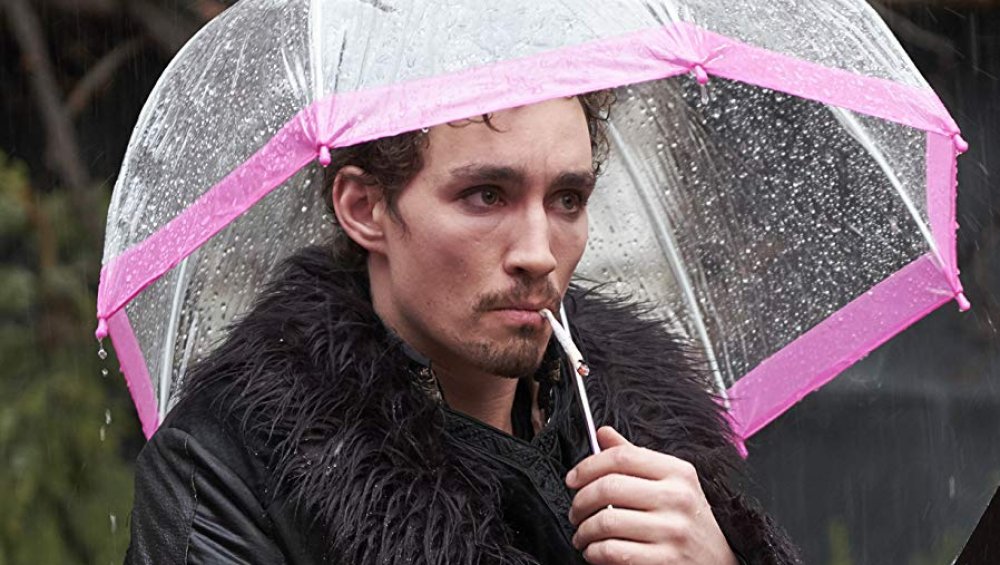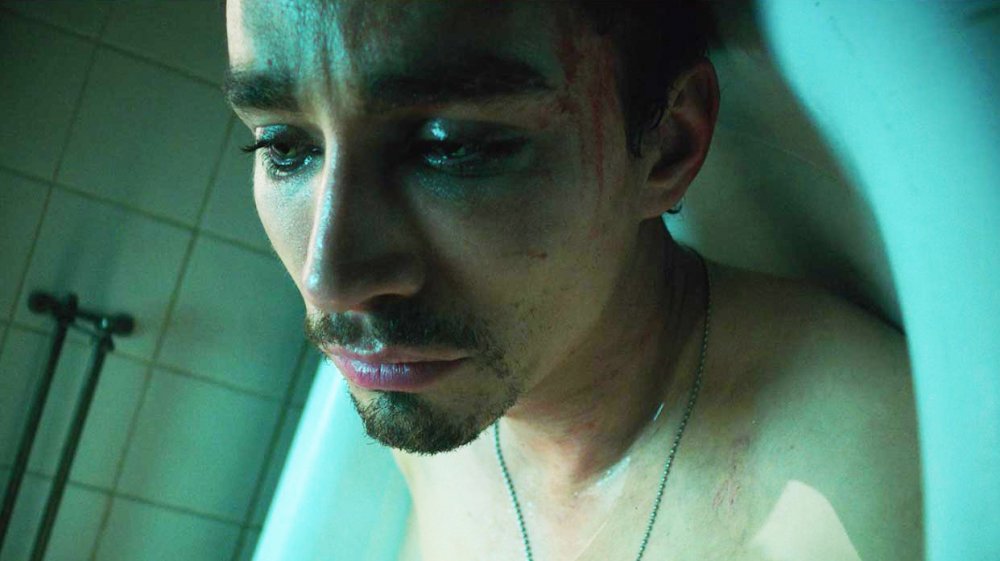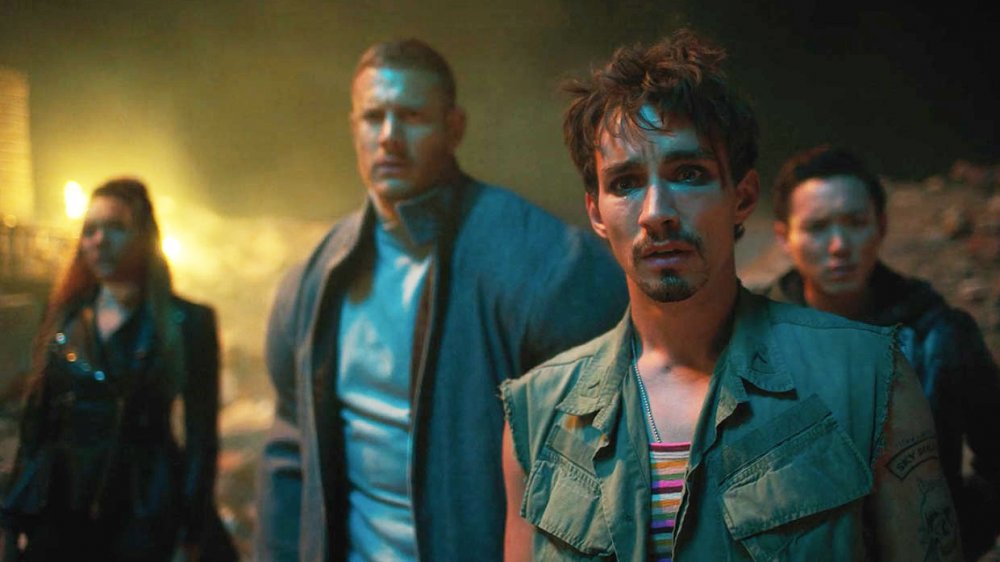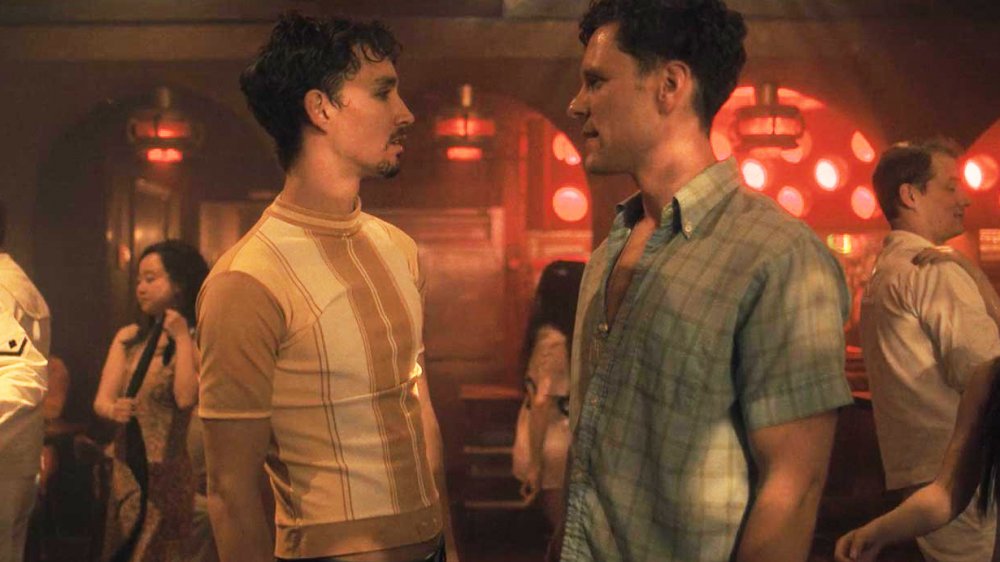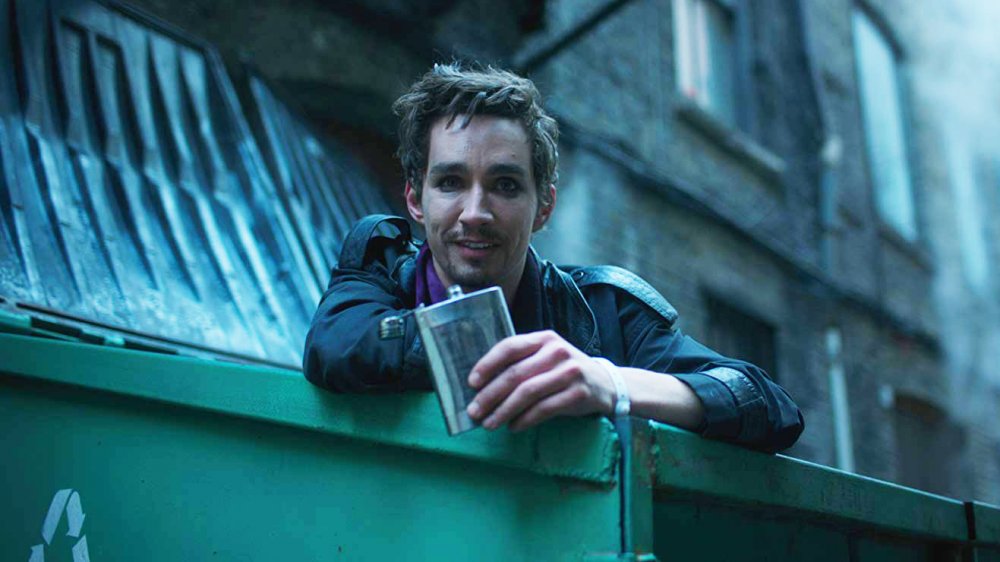The Reason So Many Fans Love Klaus Hargreeves On The Umbrella Academy
It didn't take viewers long to fall in love with Netflix's TV adaptation of Gerard Way and Gabriel Bá's Eisner award-winning comic The Umbrella Academy, which debuted in February 2019. In almost as quick a time, Robert Sheehan's Klaus Hargreeves also wormed his way into the hearts of series' fans. The character is one of 43 children all born on October 1, 1989 to mothers who otherwise showed not a single sign of pregnancy until the actual moment of childbirth. Among the seven "same-day" babies adopted by Sir Reginald Hargreeves (Colm Feore), an eccentric billionare and often cold-hearted father, Klaus spent most of his childhood training to save the world alongside his siblings, each of whom has their own set of unique abilities.
The monocled Sir Reginald ranked his little crime-stoppers by what he saw as their usefulness, ultimately dubbing Klaus "Number Four." Possessing the ability to speak to the dead, Klaus spent most of his youth being emotionally and physically tortured by visions and dreams of terrifying specters. His father's constant push for him to "control" his darker abilities was at times torturous, and though Klaus had seemingly accepted the rather sour nature of his childhood in adult life at the start of The Umbrella Academy season 1, viewers see he's failed to do the same when it comes to his powers. Klaus leans on drugs and alcohol to stave off the dead, and his siblings eventually come to dismiss him as a hedonistic and unreliable addict.
They aren't entirely wrong, yet throughout The Umbrella Academy's first season, Klaus also proves to be a far more complex and relatable character than he initially lets on. Between his distinct mix of sarcasm, loyalty, and clear-but-never boring character arc, it's easy to see why fans have taken to Number Four. Here's how The Umbrella Academy character earned his fan-favorite status.
Klaus Hargeeves' tragic (and relatable) backstory makes his triumphs even more profound
It's an accepted fact that all the Hargreeves siblings had emotionally and mentally stressful upbringings while living under Sir Reginald's care. But the first season of The Umbrella Academy offers up more distinct moments of that struggle for certain characters, and Klaus is among them. While his abilities have powerful potential, they're profoundly morbid and equally unsettling. On the episode entitled "Man on the Moon," viewers get a glimpse of this after Sir Reginald locks Klaus in a dark tomb and forces him to confront the spirits demanding his attention. To keep those haunting images and trauma at bay in his adulthood, Klaus dampens his powers with drugs and alcohol.
Unfortunately, this also perpetuates an exhausting cycle of self-degradation and mental health issues. Klaus' existing anxiety, depression, and insomnia are made worse during The Umbrella Academy season 1 when he gets hold of a time-traveling briefcase and is flung back to the Vietnam War. While his time on the battlefield isn't all bad, it gives him post-traumatic stress disorder, which he tries to quietly deal with on his own after he returns to the present day. That's on top of also trying to get clean to help his siblings — a mentally and physically demanding back-and forth of relapse and withdrawals. While none of the Hargreeves siblings' struggles should be dismissed, it seems fair to say that Klaus has one of the team's most emotionally heavy and taxing arcs.
Klaus' journey through season 1 is like a rollercoaster, but it also illustrates some heavier real-life realities and does it without glossing over the ugly parts. Fans are drawn to the fact that The Umbrella Academy is dedicated not just to telling us how Klaus struggles, but also showing it. His problems aren't one-dimensional, and The Umbrella Academy works to make the connections between Klaus' behavior and his trauma. That makes his descent out of darkness so much more meaningful and resonant, especially for fans who have been in some emotionally tougher spots themselves.
The Umbrella Academy's Klaus has one of the most dynamic personalities among the Hargreeves
While it's easy for shows with larger ensembles to pigeonhole characters into archetypes that embody a singular trait or characteristic, The Umbrella Academy mostly avoids this writing faux pas with Klaus, a bundle of endearing — when not annoying — contradictions.
He's rebellious, due in large part to his treatment by Sir Reginald while growing up, but also has a low sense of self-worth, which fuels his risky behaviors with drugs and alcohol. Klaus steals from his family and strangers for fun, and is quite impulsive — two things that get him into binds with both his siblings and the hitmen chasing Number Five (Aidan Gallagher). Coupled with his lack of self-preservation or personal motivation, Klaus' sarcasm, flippancy, and unreliability lead his siblings to believe maturity isn't in his vocabulary. Yet, for all his disagreeable qualities, Klaus has quite a few good ones.
He's fun-loving and knows how to have a good time, even if he pushes it to its limits. When he's (mostly) sober and interested in engaging in conversation, Klaus brings deep insight and/or logical reason to his siblings' arguments and discussions. He also exhibits a high level of loyalty and emotional care to his fellow Academy members. He becomes a shoulder and ear for Luther (Tom Hopper) after he discovers their father sent him to the moon for four years for no logical reason. And despite Diego (David Castañeda) and Five seeming more annoyed than not by his presence, Klaus is on hand — sometimes with a little prodding — to help them with their missions and occasionally save them from near death. Klaus' relationship with his dead brother Ben (Justin H. Min), in particular, is evidence of his dedication to his family: he chooses to not always suppress Ben's ghostly presence as he does with other spirits.
Klaus legitimately tries to be good, but is often tripped up by his insecurities and childhood traumas — making him an imperfect yet genuinely lovable character.
Klaus' development offers positive and nuanced LGBTQ+ representation on The Umbrella Academy
As Netflix developed The Umbrella Academy for TV, actor Robert Sheehan was able to offer some input on his character's romantic interests for his small-screen crossover. When adapting Klaus' trip back in time to the war, Sheehan, the series producers, and writers agreed to change his character's love interest from the comics' Vietnamese woman to an American male soldier.
Klaus' sexuality doesn't become apparent to viewers until around halfway through the first season, when he makes that time jump to Vietnam. This allows the character to be developed and judged by viewers based on his personality and actions first, meaning the story doesn't treat his flamboyance and sharp wit as traits of his queerness. Klaus is an enigmatic character and always has been. Not to mention, unlike other LGBTQ+ characters that have graced the small screen before Klaus, his trauma and internal conflict don't directly stem from his sexuality. Klaus has accepted himself, and so has his family. The inability to handle his powers is what ultimately afflicts him the most.
Finally, there's how Klaus loves. Historically, many LGBTQ+ characters have been written to focus on their sexuality, which can result in them becoming more hypersexualized on screen. Klaus is written as one of the most loving characters on the show — not just in terms of his siblings, but also in terms of his love interest, whose death he deeply grieves when he returns to the present.
Klaus is just one of TV's latest entries in the push for more inclusive narratives, and fans think he helps prove representation is moving in the right direction.
Klaus feels like a callback to another fan-favorite Robert Sheehan character
One other reason why The Umbrella Academy fans seem to love Klaus so much has to do with the actor who plays him.
Those who have followed Robert Sheehan's career will know that the Irish actor got one of his earliest and biggest breaks through the popular E4 sci-fi dramedy Misfits, on which he played the narcissistic, foul-mouthed, quick-witted Nathan Young. The British TV series followed a rag-tag bunch of young offenders doing community service who develop powers after being struck by lightning. Mostly tolerated by those around him instead of actually being liked, Nathan has the power of immortality and the ability to talk to the dead.
For many Misfits fans who followed Sheehan onto The Umbrella Academy, the similarities between Nathan and Klaus are uncanny, and even a source of viewers' positive interpretation of Klaus.
Sheehan, however, sees a distinct difference between his Umbrella Academy and Misfits characters. Speaking to Metro UK ahead of the streaming series debut, the actor said he thinks "they're different enough." He told the British outlet, "I think Nathan is a character who sort've... he wasn't sociopathic, but he didn't feel great emotional pain to any depth! He just kind of was what he was, but Klaus is completely the opposite, I think."
The Umbrella Academy star then went on to describe Klaus as a "very, very fragile creature," and a character whose pain and powers not only visibly impact him but also are something he's "burdened" by. In Sheehan's eyes, there's a lot more range and depth to Klaus than Nathan, even if they do on the surface appear to be similar characters.
And in the end, it's that depth in almost every facet of Klaus' development that makes Umbrella Academy fans love him so much.
